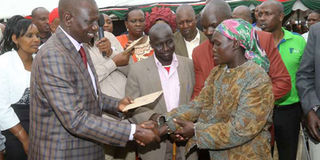Why government’s bid to save ICC suspects may not work

Deputy President William Ruto issues a cheque to Mauche Forest Evictees in Teret, Njoro, Nakuru County, on October 10, 2015. In trying to “save” Deputy President William Ruto from the ICC, the government could be doing the same thing over and over and expecting different results. PHOTO | SULEIMAN MBATIAH| NATION MEDIA GROUP
What you need to know:
- Since the Trial Chamber V(A) admitted recorded statements of witnesses, Jubilee-allied MPs have gone on overdrive to put pressure on the court through the African Union.
- Some analysts say it may have come a little too late since the prosecution has closed its case and passed the baton on to the defence who will be filing their no case to answer motions by October 23.
- Kenya and the AU have previously lobbied the UN Security Council for the deferral of the post-election cases and failed.
In trying to “save” Deputy President William Ruto from the ICC, the government could be doing the same thing over and over and expecting different results.
Since the Trial Chamber V(A) admitted recorded statements of witnesses, Jubilee-allied MPs have gone on overdrive to put pressure on the court through the African Union.
A motion by Ainamoi MP Samuel Chepkonga to re-open debate into the Waki report and a series of prayer rallies are also viewed as part of the anti-ICC fightback.
The three-way approach adopted by the government is not new.
Some analysts say it may have come a little too late since the prosecution has closed its case and passed the baton on to the defence who will be filing their no case to answer motions by October 23.
DEFERRAL OF CASES
Kenya and the AU have previously lobbied the UN Security Council for the deferral of the post-election cases and failed.
“I think there is absolutely no possibility that the Security Council will defer the Ruto case. And yes I think that the AU is making the same request as before but the result will be the same,” Prof Alex Whiting, an international law expert and a former ICC prosecutions coordinator now based at Harvard Law School told Sunday Nation in an interview.
Similarly, the head of advocacy and policy on AU, UN and Africa Situations at the Coalition for the ICC Stephen Lamony said each request or agenda item brought up for discussion at the UN Security Council is judged or considered on its own merits.
But such items should be brought by individual member states of the UN, not through regional and sub-regional bodies like the AU, he told the Sunday Nation.
“The AU is not a member of the UN. It is only member states that can make requests for an agenda item to be considered by the UNSC,” said Mr Lamony.
SUMMONING JUSTICE WAKI
On the domestic front, Mr Chepkonga (URP) who also chairs the Justice and Legal Affairs Committee wants Parliament to re-open the 2008 Commission of Inquiry into Post-Election Violence report.
“The Waki report ought to have been discussed in Parliament. But that has never happened. While we could have looked at it as Justice and Legal Affairs Committee, certain aspects and recommendations are cross-cutting like reconciliation,” said Mr Chepkonga.
According to the MP, the recent allegations by Gatundu South MP Moses Kuria that certain people procured witnesses to “fix” Mr Ruto is reason enough to form the committee to look into the Waki report.
“The people he (Mr Kuria) has named are not from one community which shows that there was a wider plan. These allegations are very serious and the National Assembly as the people’s representatives cannot ignore matters of concern to the same people,” said Mr Chepkonga.
In the same motion, Mr Chepkonga told Sunday Nation that summoning retired Appellate Judge Philip Waki could be one possibility.
Like the diplomatic efforts by the AU and Kenya to save the ICC suspects, there has been an attempt in the past to summon Justice Waki.





